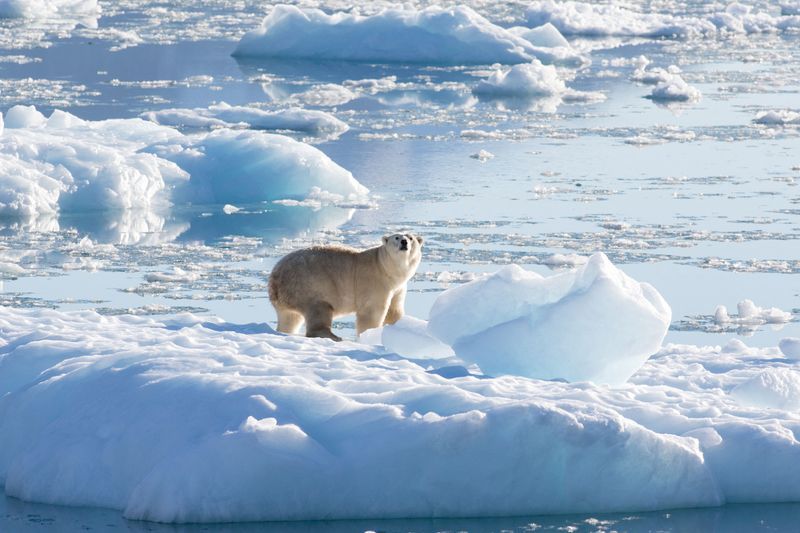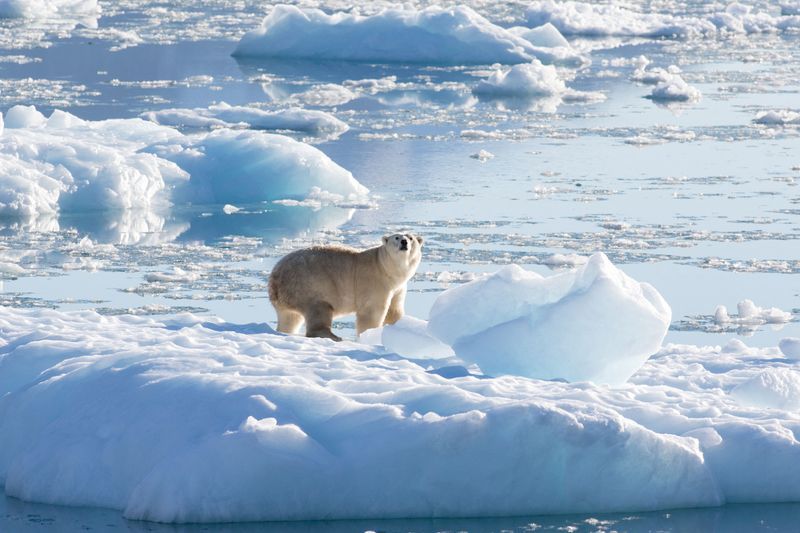
COPENHAGEN (Reuters) -Iceland has designated the potential collapse of a major Atlantic Ocean current system a national security concern and an existential threat, enabling its government to strategize for worst-case scenarios, the country’s climate minister told Reuters.
The Atlantic Meridional Overturning Circulation, or AMOC, current brings warm water from the tropics northward toward the Arctic, and the flow of warm water helps keep Europe’s winters mild.
But as warming temperatures speed the thaw of Arctic ice and cause meltwater from Greenland’s ice sheet to pour into the ocean, scientists warn the cold freshwater could disrupt the current’s flow.
A potential collapse of AMOC could trigger a modern-day ice age, with winter temperatures across Northern Europe plummeting to new cold extremes, bringing far more snow and ice. The AMOC has collapsed in the past – notably before the last Ice Age that ended about 12,000 years ago.
“It is a direct threat to our national resilience and security,” Iceland Climate Minister Johann Pall Johannsson said by email. “(This) is the first time a specific climate-related phenomenon has been formally brought before the National Security Council as a potential existential threat.”
Elevation of the issue means Iceland’s ministries will be on alert and coordinating a response, Johannsson said. The government is assessing what further research and policies are needed, with work underway on a disaster preparedness policy.
Risks being evaluated span a range of areas, from energy and food security to infrastructure and international transportation.
RIPPLE EFFECTS
An Atlantic current collapse could have consequences far beyond Northern Europe. It could potentially destabilize longtime rainfall patterns relied upon by subsistence farmers across Africa, India and South America, according to scientists.
It could also contribute to faster warming in Antarctica, where sea ice surrounding the southernmost continent as well as ice sheets atop it are already under threat from climate change.
Scientists have warned that the world is underestimating the threat that an AMOC collapse could become inevitable within the next couple of decades as global temperatures keep climbing.
The Nordic Council of Ministers funded a “Nordic Tipping Week” workshop in October with 60 experts assessing how societies might be impacted. They are finalizing recommendations from the meeting, organizers said.
“There is tons of research on the likelihood of when exactly things are going to happen,” said Aleksi Nummelin, a physical oceanographer at the Finnish Meteorological Institute. “There is much less on what is the actual societal impact.”
On Monday, scientists from more than 30 universities and international organizations sounded an alarm about the accelerated thawing of Earth’s glaciers, ice sheets and other frozen spaces.
Other climate ministries and meteorological offices across Northern Europe told Reuters they are funding more research while weighing possible risks in their climate adaptation plans.
Ireland’s weather service said its scientists briefed the country’s prime minister last year and a parliamentary committee last month. Norway’s environment ministry said it was “seeking to deepen our understanding of the issue through new research” before determining whether to classify AMOC as a security risk.
Britain said it was following scientific reports that suggested an abrupt collapse was unlikely during this century, while directing more than 81 million pounds into research to understand when the Earth’s climate systems might be pushed to a point of no return.
“The science is evolving quite rapidly and time is running out to do anything about it because the tipping point may well be quite close,” said oceanographer and climatologist Stefan Rahmstorf from Germany’s Potsdam Institute for Climate Impact Research.
Iceland is not taking any chances, as the pace of warming speeds up and greenhouse gas emissions continue to rise.
“Sea ice could affect marine transport; extreme weather could severely affect our capabilities to maintain any agriculture and fisheries, which are central to our economy and food systems,” Johannsson said.
“We cannot afford to wait for definitive, long-term research before acting.”
(Reporting by Ali Withers and Stine Jacobsen in Copenhagen; Editing by Katy Daigle and David Gregorio)






